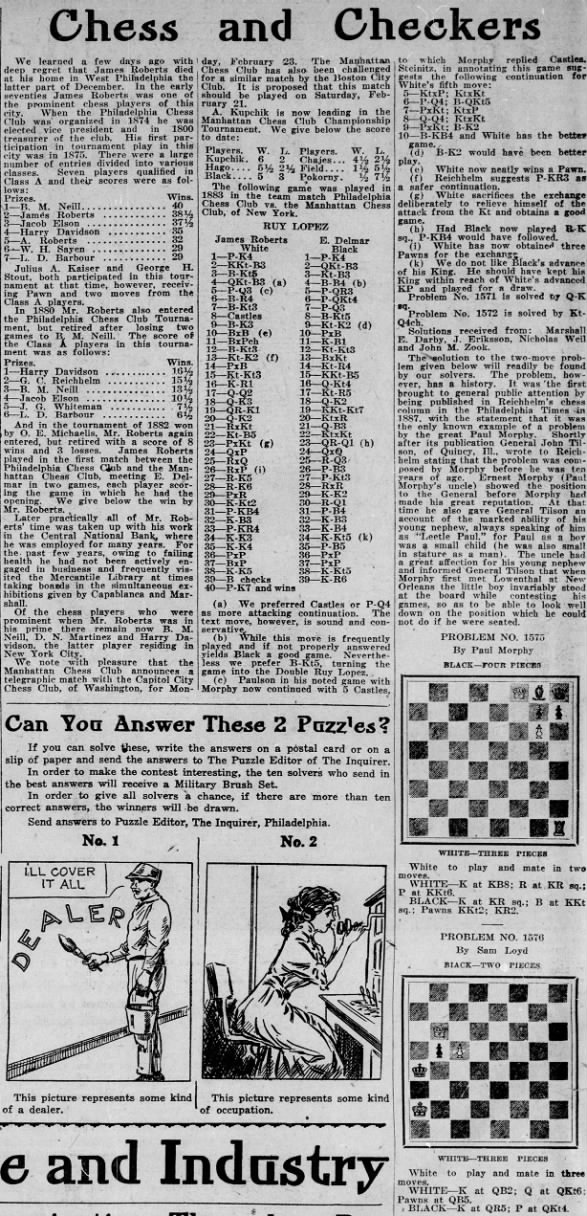 Chess and Checkers 18 Jan 1920, Sun The Philadelphia Inquirer (Philadelphia, Pennsylvania) Newspapers.com
Chess and Checkers 18 Jan 1920, Sun The Philadelphia Inquirer (Philadelphia, Pennsylvania) Newspapers.com
We learned a few days ago with deep regret that James Roberts died at his home in West Philadelphia the latter part of December. In the early seventies James Roberts was one of the prominent chess players of this city. When the Philadelphia Chess Club was organized in 1874 he was elected vice president and in 1900 treasurer of the club. His first participation in tournament play in this city was in 1875. There were a large number of entries divided into various classes. Seven players qualified in Class A and their scores were as follows: —
We note with pleasure that the Manhattan Chess Club announces a telegraphic match with the Capitol City Chess Club, of Washington, for Monday, February 23, 1920. The Manhattan Chess Club has also been challenged for a similar match by the Boston City Club. It is proposed that this match should be played on Saturday, February 21.
A. Kupchik is now leading in the Manhattan Chess Club Championship Tournament. We give below the score to date.—
The following game was played in 1883 in the team match Philadelphia Chess Club vs. the Manhattan Chess Club, of New York.
James Roberts vs Eugene Delmar
New York-Philadelphia m (1883), USA
Four Knights Game: Spanish. Classical Variation (C48) 1-0
(a) We preferred Castles or P-Q4 as more attacking continuation. The text move, however, is sound and conservative.
(b) While this move is frequently played and if not properly answered yields Black a good game. Neverthelss we prefer B-Kt5, turning the game into the Double Ruy Lopez.
(c) Paulson in his noted game with Morphy now continued with 5 Castles, to which Morphy replied Castles. Steinitz in annotating this game suggests the following continuation for White's fifth move;
5. KtxP; KtxKt
6. P-Q4;B-QKt5
7. PxKt;KtxP
8. Q-Q4; KtxKt
9. PxKt; B-K2
10. B-KB4 and White has the better game.
(d) B-K2 would have been better play.
(e) White now neatly wins a Pawn.
(f) Reichhelm suggests P-KR3 as a safer continuation.
(g) White sacrifices the exchange deliberately to relieve himself of the attack from the Kt and obtains a good game.
(h) Had Black now played R-K sq., P-KB4 would have followed.
(i) White has now obtained three Pawns for the exchange.
(k) We do not like Black's advance of his King. He should have kept his King within reach of White's advanced KP ad played for a draw.
The solution to the two-move problem below will readily be found by our solvers. The problem, however, has a history. It was the first brought to general public attention by being published in Reichhelm's chess column in the Philadelphia Times in 1887, with the statement that it was the only known example of a problem by the great Paul Morphy. Shortly after its publication General John Tilson, of Quincy, Ill., wrote to Reichhelm stating that the problem was composed by Morphy before he was ten years of age. Ernest Morphy (Paul Morphy's uncle) showed the position to the General before Morphy had made his great reputation. At that time he also gave General Tilson an account of the marked ability of his young nephew, always speaking of him as “Leetle Paul.” for Paul as a boy was a small child (he was also small in stature as a man.) The uncle had a great affection for his young nephew and informed General Tilson that when Morphy first met Lowenthal at New Orleans the little boy invariably stood at the board while contesting his games, so as to be able to look well down on the position which he could not do if he were seated.
Problem No. 1575 by Paul Morphy. Black Four Pieces, White Three Pieces. White to play and mate in two moves.
The Philadelphia Inquirer, Philadelphia, Pennsylvania, Sunday, January 18, 1920 Problem No. 1576 by Sam Loyd. Black Two...
Posted by Bobby Fischer's True History on Thursday, January 23, 2020
Problem No. 1576 by Sam Loyd. Black Two Pieces. White Three Pieces. White to play and mate in three moves.
FEN 8/8/1Q6/1pP5/k7/8/K7/8 w - - 0 1
Solution: 1. Qh6 Kb4 2. Qc1 Ka5 3. Qa3#






















